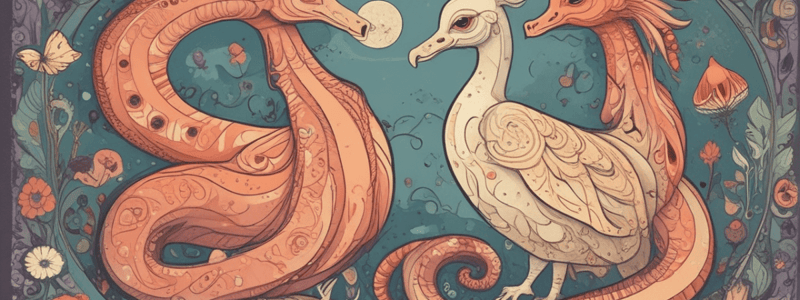Podcast
Questions and Answers
What is the process called when cells from one end of the blastula fold inwards in animal embryonic development?
What is the process called when cells from one end of the blastula fold inwards in animal embryonic development?
- Budding
- Gastrulation (correct)
- Parthenogenesis
- Fission
Which reproductive process is exclusive to animals and not found in fungi or other multicellular eukaryotes?
Which reproductive process is exclusive to animals and not found in fungi or other multicellular eukaryotes?
- Budding
- Gastrulation (correct)
- Fission
- Parthenogenesis
What is the name of the structure formed by gastrulation and opens to the outside via the blastopore?
What is the name of the structure formed by gastrulation and opens to the outside via the blastopore?
- Anthocodium
- Archenteron (correct)
- Blastocoel
- Archegonium
Which process is characterized by a cell dividing into two separate daughter cells, each with an equal number of genetically identical chromosomes?
Which process is characterized by a cell dividing into two separate daughter cells, each with an equal number of genetically identical chromosomes?
What type of reproduction involves the development of a new individual from a single cell, without the involvement of both parents?
What type of reproduction involves the development of a new individual from a single cell, without the involvement of both parents?
Which type of reproduction involves the growth of a new organism from a small part of the parent's body?
Which type of reproduction involves the growth of a new organism from a small part of the parent's body?
What type of reproduction involves the birth of live young without fertilization?
What type of reproduction involves the birth of live young without fertilization?
During embryonic development, what process transforms the zygote into an eight-cell embryo?
During embryonic development, what process transforms the zygote into an eight-cell embryo?
What is the term for the hollow ball of cells surrounding a central cavity during embryonic development?
What is the term for the hollow ball of cells surrounding a central cavity during embryonic development?
Which process involves the formation of a gastrula with different layers of embryonic tissues?
Which process involves the formation of a gastrula with different layers of embryonic tissues?
What is the term for the process by which Hydra reproduces?
What is the term for the process by which Hydra reproduces?
What type of reproduction involves the splitting of an organism into two or more individuals?
What type of reproduction involves the splitting of an organism into two or more individuals?
What is the primary difference between female and male gametes in animals?
What is the primary difference between female and male gametes in animals?
What percentage of animal phyla exhibit asexual reproduction?
What percentage of animal phyla exhibit asexual reproduction?
What is the process called when an animal splits into two or more parts that regenerate into complete organisms?
What is the process called when an animal splits into two or more parts that regenerate into complete organisms?
Which type of reproduction involves the development of an embryo from an unfertilized egg cell?
Which type of reproduction involves the development of an embryo from an unfertilized egg cell?
What is a benefit of asexual reproduction?
What is a benefit of asexual reproduction?
Which type of reproduction is found only among invertebrates?
Which type of reproduction is found only among invertebrates?
Flashcards are hidden until you start studying
Study Notes
Embryonic Development in Animals
- Cells from one end of the blastula fold inwards, eventually filling the blastocoel, producing two layers of embryonic tissues: the ectoderm (outer layer) and the endoderm (inner layer).
- Gastrulation is unique to animals; it’s not found in fungi or other multicellular eukaryotes.
- The pouch formed by gastrulation, called the archenteron, opens to the outside via the blastopore.
Hox Genes in Animal Development
- Hox genes are crucial in animal evolution because they play a fundamental role in determining the body plan and segment identity during embryonic development.
- Hox proteins coordinate the development of various structures along the anterior-posterior axis, e.g. legs, antennae, and wings in fruit flies, or the different types of vertebrae in humans.
- The Hox family of genes is highly conserved, with a similar arrangement along chromosomes across animal phyla.
- The number of Hox copies varies among animal phyla, e.g. least in jellyfish, most in vertebrates.
Developmental Events in Animals
- Development occurs at many points in the life cycle of animals.
- Fertilization creates a spherical diploid zygote that undergoes embryonic development.
- Stages in early embryonic development of animals:
- Cleavage transforms the zygote into an eight-cell embryo.
- Continued cleavage produces a multicellular, hollow blastula.
- Gastrulation forms a gastrula with different layers of embryonic tissues.
Characteristics of Animals
- Development is a fundamental characteristic of animals.
- Asexual reproduction is found in nearly half of all animal phyla.
- Mechanisms of asexual reproduction:
- Fission or fragmentation occurs commonly in invertebrate animals.
- Budding is found only among invertebrates.
- Parthenogenesis is the development of an embryo from an unfertilized egg cell.
- Benefits of asexual reproduction:
- Supports rapid population growth when conditions are favourable.
- Provides an alternative to sexual reproduction when reproductive opportunities are limited.
- Some species can alternate between sexual and asexual strategies.
Studying That Suits You
Use AI to generate personalized quizzes and flashcards to suit your learning preferences.



